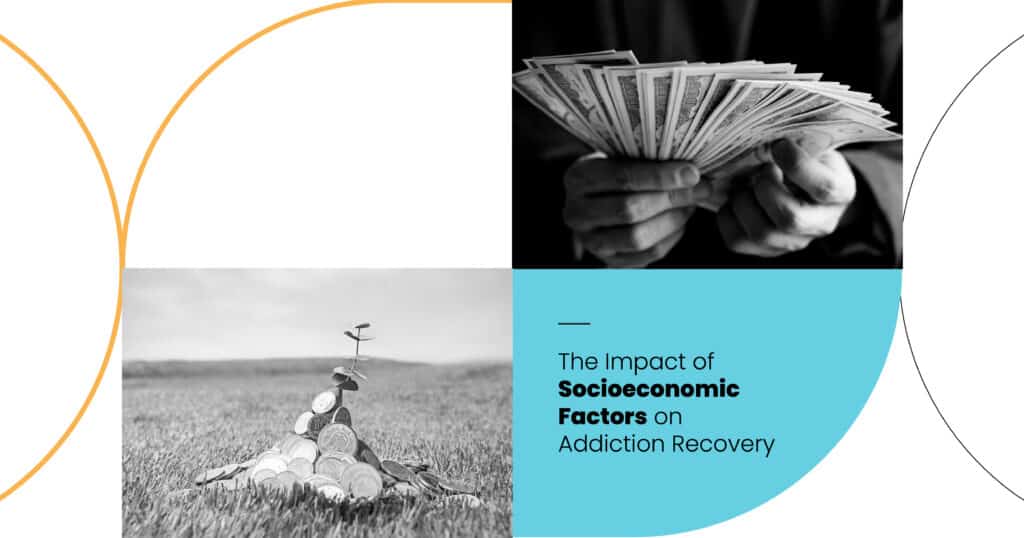Addiction is a multifaceted disease that affects individuals from all walks of life. However, the journey to recovery is not solely determined by personal willpower or access to medical treatment. Socioeconomic factors play a significant role in shaping both the path to addiction and the road to recovery. This blog post delves into the intricate ways socioeconomic conditions influence addiction recovery, aiming to provide a comprehensive understanding of these dynamics.
Addiction recovery is a complex and challenging process influenced by various factors beyond the individual’s control. Socioeconomic factors, including income level, employment status, education, and social support, profoundly impact an individual’s ability to access and benefit from addiction treatment. This blog post explores these factors in detail, highlighting their significance and offering insights into overcoming related barriers.
What are Socioeconomic Factors?
Socioeconomic factors refer to the social and economic conditions that influence individuals’ lives and opportunities. These include:
- Income Level: The amount of money individuals or families earn.
- Employment Status: Whether an individual is employed, unemployed, or underemployed.
- Education: The level of education an individual has attained.
- Social Support: The networks of family, friends, and community that provide emotional and practical assistance.
The Link Between Socioeconomic Status and Addiction
Understanding the connection between socioeconomic status (SES) and addiction is crucial. Research shows that individuals from lower socioeconomic backgrounds are more vulnerable to substance abuse and addiction. Factors contributing to this vulnerability include:
- Stress and Trauma: Higher levels of stress and exposure to trauma, common in low SES communities, can lead to substance use as a coping mechanism.
- Lack of Access to Healthcare: Limited access to healthcare services can prevent early intervention and adequate treatment for addiction.
- Educational Disparities: Lower educational attainment can result in a lack of awareness about the risks of substance abuse and available treatment options.
How Socioeconomic Factors Impact Addiction Recovery
Access to Healthcare
Access to healthcare is a critical component of addiction recovery. Socioeconomic disparities can limit individuals’ ability to obtain necessary medical and psychological treatment. Key issues include:
- Insurance Coverage: Individuals from lower SES backgrounds often lack comprehensive health insurance, making it difficult to afford addiction treatment.
- Availability of Services: Rural and low-income urban areas may have fewer treatment facilities and mental health professionals, limiting access to care.
- Quality of Care: The quality of addiction treatment services can vary significantly, with lower SES individuals often receiving substandard care.
Employment and Financial Stability
Employment and financial stability are essential for sustaining recovery. They influence:
- Access to Treatment: Steady employment and financial resources enable individuals to afford treatment and related expenses.
- Stress Levels: Financial instability and unemployment can increase stress, a significant relapse trigger.
- Reintegration into Society: Gainful employment aids in building a stable routine and sense of purpose, crucial for long-term recovery.
Education and Awareness
Education impacts addiction recovery in several ways:
- Understanding Addiction: Higher education levels often correlate with better understanding of addiction as a disease, reducing stigma and encouraging treatment.
- Awareness of Treatment Options: Educated individuals are more likely to be aware of and seek out effective treatment options.
- Prevention: Educational programs can play a vital role in preventing substance abuse by providing information and resources.
Social Support Systems
Strong social support systems are vital for successful recovery. Factors influencing support include:
- Family Support: Families can provide emotional and financial support, crucial for individuals in recovery.
- Community Resources: Community organizations and support groups offer additional resources and a sense of belonging.
- Peer Support: Relationships with peers in recovery can provide encouragement and accountability.
Addressing Socioeconomic Barriers in Addiction Treatment
Addressing socioeconomic barriers is essential for improving addiction treatment outcomes. Strategies include:
- Policy Changes: Advocating for policies that increase access to healthcare, affordable housing, and employment opportunities.
- Community Programs: Developing community-based programs that provide education, support, and resources for individuals in recovery.
- Insurance Reforms: Expanding insurance coverage to include comprehensive addiction treatment and mental health services.
- Educational Initiatives: Implementing educational programs to raise awareness about addiction and available treatment options.
Frequently Asked Questions
1. How does socioeconomic status affect the likelihood of addiction?
Individuals from lower socioeconomic backgrounds are more likely to experience higher levels of stress, trauma, and limited access to healthcare, increasing the risk of substance abuse and addiction.
2. Why is employment important for addiction recovery?
Employment provides financial stability, reduces stress, and helps individuals establish a structured routine, all of which are crucial for sustaining long-term recovery.
3. What role does education play in addiction recovery?
Education enhances understanding of addiction, reduces stigma, and increases awareness of treatment options, contributing to more informed and proactive approaches to recovery.
4. How can communities support individuals in addiction recovery?
Communities can support individuals by offering resources such as support groups, educational programs, and access to healthcare services, fostering a supportive environment for recovery.
5. What can be done to improve access to addiction treatment?
Improving access involves policy changes, expanding insurance coverage, and developing community-based programs that address the unique needs of individuals from various socioeconomic backgrounds.
Conclusion
Socioeconomic factors significantly influence addiction recovery, affecting access to healthcare, financial stability, education, and social support. By understanding these factors, we can develop more effective strategies to support individuals in their recovery journeys. Addressing socioeconomic barriers requires a comprehensive approach, involving policy changes, community support, and educational initiatives.
Why Choose Coastal Detox of Southern California?
At the Coastal Detox of Southern California, we understand the profound impact socioeconomic factors can have on addiction recovery. Our premier addiction treatment center offers a comprehensive range of services tailored to meet the unique needs of each individual. We provide:
- Personalized Treatment Plans: Customized plans that consider each individual’s socioeconomic background and specific challenges.
- Expert Medical Care: Access to top-tier medical professionals and state-of-the-art facilities.
- Supportive Environment: A compassionate and supportive environment to foster healing and recovery.
- Community Resources: Connections to community resources and support networks to aid in long-term recovery.
Choosing the Coastal Detox of Southern California means choosing a path to recovery supported by a team dedicated to overcoming the socioeconomic barriers that may stand in your way. Contact us today to learn more about our services and start your journey to recovery.









